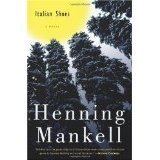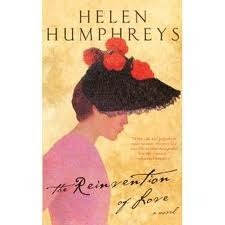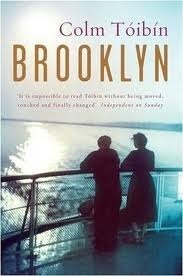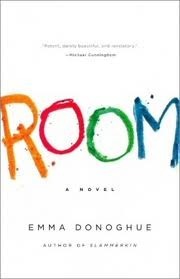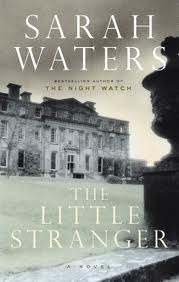Sandra Gulland's Blog, page 30
December 25, 2011
My essential apps for iPad
Next up in my year-in-review is the list of apps I use almost daily on my iPad.
I've had my iPad since it first came out. I thought it would not be an essential "tool" — I've learned otherwise. It is always with me.
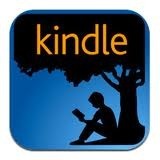
Kindle: With the Kindle app, I test a lot of books. If I read an interesting review, I immediately download the sample chapter from Amazon.com; in this way I decide which books I'm actually going to buy.
I like reading books on the Kindle app because I can highlight passages, which are then stored on-line in my account at kindle.amazon.com. This is a huge bonus for research because I can copy the highlights and send them to Evernote or paste them into DevonThink for future reference.

Flipboard: This app takes my social network news feeds (such as on FaceBook, Twitter, Google Reader, etc.) and turns them into a magazine format. Awesome.
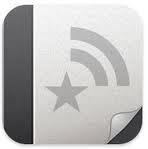
Reeder: I find that the iPad has very much changed my reading habits — and I think for the better. I read blogs regularly now, largely because of the ease of the Reeder app. (I'll post my favorite blogs next.)
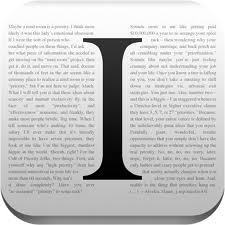
Instapaper: I often come across a link to an on-line article I want to read, but just not at that moment. I click "Read Later" and it's stored to Instapaper. Later, at leisure, I can read the article comfortably on my iPad. I can also highlight passages and send them to Evernote, etc.
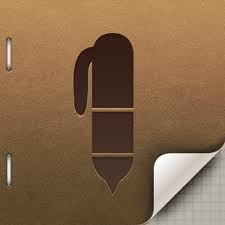
Penultimate (with stylus): Penultimate allows me to scribble notes to myself — a thought for the book I'm writing, for example; notes for a review; something for the To Do List. I want to note these thoughts down quickly, not peck them out slowly on the iPad keyboard. Penultimate is perfect for this, paired with the Griffin stylus I keep tucked into my iPad cover.
Two other apps I use almost daily are Relax & Rest (guided meditations to nature sounds or music, excellent for afternoon cat-naps, and Daily Yoga.
Two "wow" apps I recommend highly are:
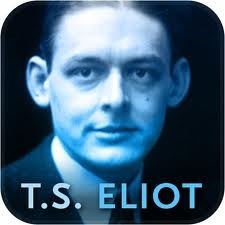
T.S. Eliot's the Waste Land: beautiful.
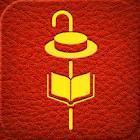
The Fantastic Flying Books of Mr. Morris Lessmore: simply enchanting.
Enjoy!
What are your favourite apps?
December 24, 2011
On heartfullness and vulnerability
I was moved by a TED talk I saw on Lilian Nattel's blog: "The power of vulnerability" by Brene Brown. It gives an especially important message in this season, but — more importantly — it seems to me to be key to what writing is about.
December 17, 2011
Books! To give and receive …
I'm succumbing to the "year-in-review" frenzy. Pepys did as much, I recall, so this is an old tradition. No doubt cavemen and women did the same.
A friend, Julie Levi, wrote asking for book recommendations, so I'll begin with books.
I've read quite a few books this year, but I also started a great number and abandoned them. I've become increasingly particular, I notice. Life is so short!
This list, then, is not only of books I couldn't put down, but the ones that lingered in my mind. They are the books I urge friends to read — and, given the season, some would make excellent gifts.
So, in no particular order:
FICTION:
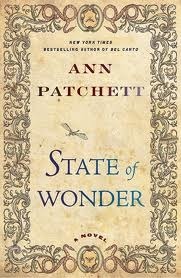
State of Wonder, by Anne Patchett. Okay, I confess that I haven't finished this novel yet, but it's so finely-crafted I have no qualms about including it. It's a contemporary novel with a mystery at its core. It would make an excellent gift for the literary reader in your life (such as yourself).
Italian Shoes, by Henning Mankell. Those of you who know Mankell will understand. The members of my book club adore him, and, now that I've read him, I do too. I've not read his mysteries, but my husband has read one and enjoyed it. It's hard to describe his appeal because he's a little bizarre.
 The Reinvention of Love, by Helen Humphreys. I love everything Helen Humphreys writes. She's one of my favourite historical authors. This spare — and just a bit strange — little novel, this twirl through the circle surrounding the French author Victor Hugo, will appeal to those who love French culture and finely crafted prose. (And don't the two just seem to go together?)
The Reinvention of Love, by Helen Humphreys. I love everything Helen Humphreys writes. She's one of my favourite historical authors. This spare — and just a bit strange — little novel, this twirl through the circle surrounding the French author Victor Hugo, will appeal to those who love French culture and finely crafted prose. (And don't the two just seem to go together?)
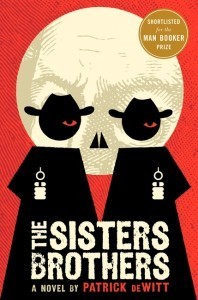
 The Sisters Brothers, by Patrick deWitt. This poetic, outrageous, laugh-out-loud funny and gripping cowboy novel about a couple of hit-men swept through the international awards like a flu this fall. Of all the books on this list, I think this one would make the best gift, either for a man or woman, old or young — and if you buy it now, you can read yourself it first, because it isn't long.
The Sisters Brothers, by Patrick deWitt. This poetic, outrageous, laugh-out-loud funny and gripping cowboy novel about a couple of hit-men swept through the international awards like a flu this fall. Of all the books on this list, I think this one would make the best gift, either for a man or woman, old or young — and if you buy it now, you can read yourself it first, because it isn't long.
Brooklyn, by Colm Toibin. If you're looking for a delicious novel to sink into this winter by the fire: this is it.
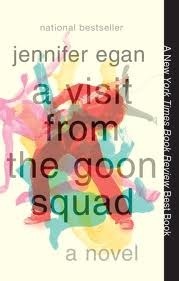
A Visit from the Goon Squad, by Jennifer Egan. Hip, smart, crackling with wit — and well deserving of the Pulitizer prize, in my opinion.
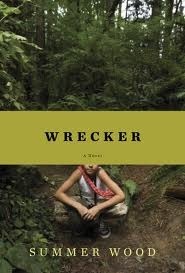
Wrecker, by Summer Wood. This was my shout-out novel of the year. I bought a copy just to pass around. If you live in a back-to-the-land community (or would like to), this novel will especially appeal. Summer Wood is a wonderful writer with great heart.
 Room, by Emma Donoghue. The subject of this amazing novel scares some readers off. Persevere. Donoghue's rendering of the voice of a young boy is simply magical, as is the ending.
Room, by Emma Donoghue. The subject of this amazing novel scares some readers off. Persevere. Donoghue's rendering of the voice of a young boy is simply magical, as is the ending.
The Little Stranger, by Sarah Waters. One of her best, I think. Haunting. Great for a stormy night. Prepare not to get much sleep!
TEEN FICTION:
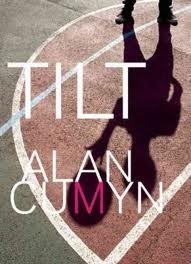
 Tilt, by Alan Cumyn. This is a book for the older teens on your list — but I suggest that you read it yourself. I adored Tilt. Alan Cumyn has created a wonderfully engrossing, charming coming-of-age story.
Tilt, by Alan Cumyn. This is a book for the older teens on your list — but I suggest that you read it yourself. I adored Tilt. Alan Cumyn has created a wonderfully engrossing, charming coming-of-age story.
I should also mention that The Hunger Games by Suzanne Collins is a tightly-plotted apocalyptic novel that you might want to read, if only to know what everyone is talking about. It's well done and particularly well imagined — with disturbing echos of our "reality TV" world.
I'm going to simply list the rest of my list (without links and cover images): the day awaits!
POETRY:
Origami Dove, by Susan Musgrave. Wonderful.
NON-FICTION:
Steve Jobs, by Walter Isaacson: a compulsively-readable biography about an eccentric hippy who never lost the faith. Read it!
The Sound of a Wild Snail Eating, a memoir by Elisabeth Tova Bailey. Enchanting!
 A New Leaf by Merilyn Simonds. This would be a fantastic gift for gardeners. I'm not even a gardener, but I relished every word.
A New Leaf by Merilyn Simonds. This would be a fantastic gift for gardeners. I'm not even a gardener, but I relished every word.
 The Tiger: A True Story of Vengeance and Survival, by John Vaillant. Terrifying! And with a strong ecological message.
The Tiger: A True Story of Vengeance and Survival, by John Vaillant. Terrifying! And with a strong ecological message.
A Week at the Airport by Alain De Bottom. Simply delightful. Perfect travel book!
IMPOSSIBLE TO CLASSIFY:
Squirrel Seeks Chipmunk, by David Sedaris. Oh, my goodness! Sedaris has done it again. This book is the perfect gift for anyone with a warped sense of humour. (That's all of us, no?)
Enjoy!
What are your "Best of the Best"?
December 13, 2011
On counting blessings
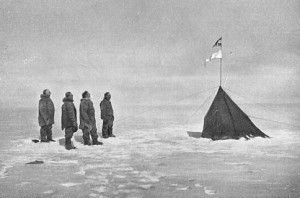
I suffered two losses today: Touchstone (a part of Simon & Schuster), my long-time publisher in the U.S., has turned down The Next Novel. I have four novels with them — with extraordinary sales overall — so I'm sad about this.
Ironically, the editor loved the novel, but the numbers just didn't add up — and it's all about numbers these days. Mistress of the Sun didn't sell as well as the Trilogy — Really! Who could out-sell Josephine? — and when the sales of your last publication tilt down, that's all that matters. [See a post I wrote on this for Writers Unboxed, "Tyranny of the Numbers."]
Basically, from a career-perspective, I'd need to write a strong commercial title to tilt those numbers back up. I'd need to write about a known historical person — a "marquee" subject.
I don't write for the market — and no writer should, in my opinion (in part because "the market" is an illusive beast). I write because there is something in a story that irresistibly interests me, and trust that readers will likewise find it worthy.
My other loss saddens me almost as much. I had a blog on Tumblr — "Ink" — where I tucked all the writing wisdoms I came upon. I had very few followers, but I loved this blog. I kept it for myself. By accident, I deleted it — and now it's simply gone. There is no getting it back.
The wonderful thing about being a writer is the work itself — that's what matters — so in spite of these losses, I feel buoyant. Today is a day to count my blessings: and I have quite a few, in fact. Many!
{Photo: At the South Pole, December 1911, from Wikipedia. Don't ask me why I think the image suits this blog post — it just does!}
December 12, 2011
Have you read … All's Well that Ends Well? (War and Peace): on disastrous first titles
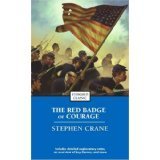 Titles are hard, without a doubt, and a good title can make a book (or, at the least, catch an agent's or editor's eye).
Titles are hard, without a doubt, and a good title can make a book (or, at the least, catch an agent's or editor's eye).
Consider this list at The Penguin Press.
Would Alex Haley's Roots: The Saga of an American Family have been as successful as Before This Anger?
What about Stephen Crane's original title for The Red Badge of Courage: Private Fleming, His Various Battles?
Which from the list do you think are the most disastrous?
December 11, 2011
Remedies for Itotallysuckitus
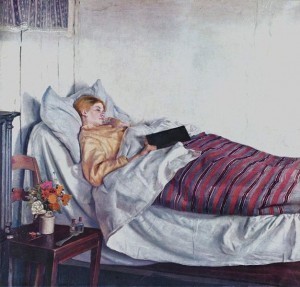
A reader on GoodReads just sent me a lovely note, describing my books as "fiendishly addictive." I love that.
I was contacted recently by a university student who was working on a paper on historical mother-daughter relationships. She wanted to consult with me about Josephine and her daughter Hortense, which I was happy to do. She introduced herself, saying, "At one time, I'm sure I was your youngest fan."
She was only ten when her drama teacher gave her The Many Lives & Secret Sorrows of Josephine B. This was before Tales of Passion, Tales of Woe, the second in the Trilogy, had even been published, and she made her mother drive her to Barnes & Noble three times, hoping that it had been released.
Such testimonials are important to a writer — every writer — because of the common writerly affliction "Itotallysuckitis." (Thanks to Therese Fowler, who didn't coin the phrase, but passed it on.)
Author Carleen Brice wrote an excellent post on dealing with this affliction for Writer Unboxed: "Writing through doubt."
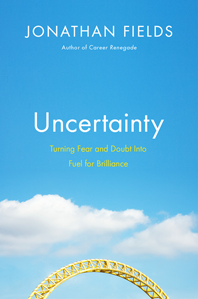
I recently started reading Uncertainty: Turning Fear and Doubt into Fuel for Brilliance by Jonathan Fields. Is it an early sign of Itotallysuckitis that I've gravitated toward this title?
There are degrees of Itotallysuckitis, of course. At worse, I become convinced that the novel I've been working on slavishly for four years is unpublishable.
Right now, for me, it's more the feeling of facing a humbling yet exciting challenge. I'm fine with that: it's one of the things I love about writing. It's never going to be rote, or easy, or assured. It's always going to take me into new realms.

I'm reminded of a photo of Sarah Waters' office. Note the poster on her wall: [Stay] calm and carry on. I think "Carry on" is an excellent prescription for Itotallysuckitus.
Do you suffer from attacks of Itotallysuckitus? What are your remedies?
{Image at top: "The Sick Girl" by Michael Ancher, 1882. The photo of Sarah Waters office is from the wonderful Guardian series, "Writers' rooms." A Google search of Itotallysuckitus will bring up a number of references.}

I've two interviews on the lovely on-line magazine, My French Life: Part One and Part Two. I think they did a great job. (If you're a Francophile, contact them. They're looking for people to interview.)
Yesterday I spent hours struggling with DropBox in order to get files from my excellent Sandra Gulland Ink typist Ed, in Romania. (I love saying that.) Now I have the files on my computer and only need to organize and proof them. Poco a poco!
December 9, 2011
What the Dickens!
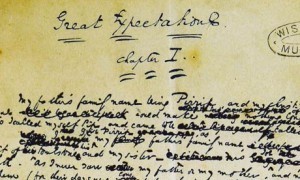
Don't you love having a glimpse of a great writer at work? (And don't you think his typist deserves some credit?)
"Dickens manuscript illuminates author's workings" — the article in the Guardian.

What I've been up to:
Newsletter! (I know, I've mentioned that before.)
I just finished checking the "galleys" (files) for the Trilogy, in preparation for launching Sandra Gulland Ink in February.
E-book publishing can be time-consuming in the same way print publishing is: everything needs to be checked and rechecked. (No, I'm not complaining. I love all this.)
Of interest to Canadians e-book publishing on Kindle.com: you have to send Amazon a W-8BEN form (with affidavit) so that they don't withhold 30% of your income against taxes. I don't know if that's the case for all the other Amazon sites (Amazon.uk etc.) — but I need to find out.
A friend of our son Chet calls December "the Friday of the months." So apt! The holiday spirit has definitely landed chez nous.
December 6, 2011
The Next Novel in a box
I sent off a newsletter yesterday — send! — and was met by a tsunami of email responses. Wonderful! (If you didn't get the newsletter, you can read it here. If you want to be on the mailing: let me know here.)
Today I set up promotion plans for the February launch of Sandra Gulland Ink. I'd like to get most of Ink details attended to before the January arrival of my editor's notes on The Next Novel.
But now, thanks to a new router, I've been spending way too much time fooling around on the Net. A Tweet led me to Eleanor Brown's Facebook page, which led me to Wordle.net. Fun!
I copied all of The Next Novel into Wordle.net, and this is what I got:
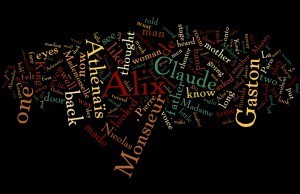
Wordle.net can actually be a useful tool for identifying words that are used too often. "Eyes," for example.
So there you have it: The Next Novel in a box.
Now you show me yours.
December 3, 2011
She likes it!

My editor, Iris Tupholme at HarperCollins Canada, likes my 5th draft of This Bright Darkness (working title) "very much."
You can imagine how relieved and happy I feel!
This time, when I submitted the manuscript, I included a description — the type of thing a reader might read on the cover flap. It's a draft, and too long, but here it is:
This Bright Darkness
When a maid's duties include a lot more than making up the bed . . .
This Bright Darkness is a work of fiction inspired by the real life of a maid: Claude des Oeillets. The daughter of itinerant actors and therefore impoverished and socially scorned, she nevertheless rises to become the confidential attendant to the most powerful woman in the 17th century French court of the Sun King: Madame de Montespan, mistress of the charismatic king. However, in Claude's so-called "respectable" position, she is required to obtain love potions and other magical charms as well as occasionally satisfy the king's sexual needs (thereby bearing him a daughter).
Claude's life is like an ever-revolving stage set: in the First Act, she's the starving child of a family of caravan players, devoted to tending her beloved "half-wit" baby brother; in the Second, she's with the greats of French theatre — Pierre Corneille, Molière, Racine — witnessing her mother's amazing rise to stardom in the fantastical (but cut-throat) world of the 17th century French stage; in the Third, she's front and center in the dazzling world of the charismatic Sun King.
Insinuating herself throughout the worlds of both the theatre and Court is the witch Catherine Voisin, sometimes benevolent and kind, but ultimately ruthless, a woman willing to sacrifice innocent lives in order to satisfy the corrupt desires of her wealthy clients. A woman who ultimately pays for her sins on the pyre — but not without exposing the rot at the heart of these glittering worlds.
Claude rises from poverty to a position of power and influence because she is loyal and can be trusted, a vow she made as a teen to her father — but as the mercurial Montespan becomes ever more desperate to hold onto the King's sexual favor, innocent love charms move into the realm of deadly Black Magic, and Claude must choose between betraying a trust or doing the right thing — an act which will put her own life at risk, as well as the lives of those she loves dearest.
What do you think? Edits welcome!
November 3, 2011
First line: majority rules
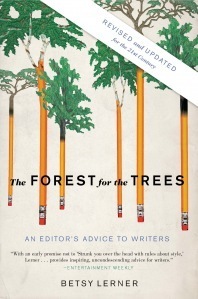
Here's what NY agent Betsy Lerner had to say about my first line:
Winter was coming – I could smell it.
I liked the simplicity here, too. We have no idea who the speaker is, who the first person narrator is, but I feel like I do. I think this simple sentence is filled with foreboding. Winter is coming, no doubt, but what else: Trouble? Pain? Violence? To me, it's pregnant with possibility.
And so, given this and what many others had to say, I'm sticking with it. Happily, I should add. (See my post below for the alternative.)
Do check out Lerner's blog: The Forest for the Tress. She's irreverent, poetic, caustic, shocking and moving. Her book by that title, on writing, is also very good.
Now: back to the rest of the puzzle of The Next Novel — which I've now titled: This Bright Darkness.
What do you think?

